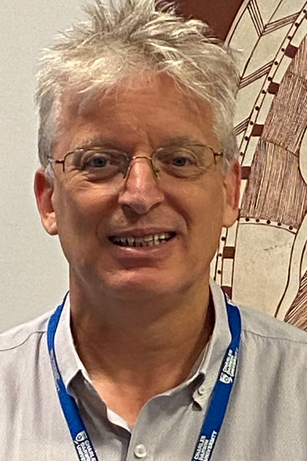Dr Joël Rioux was born in French Canada (Québec) in a small community by the Saint-Lawrence River (St-Laurent) called “Rivière-du-Loup”. He has experience in the Canadian Arctic teaching French to Inuit students in Umiujaq, by the Hudson Bay. He has substantive experience with learning and teaching of the Montessori Method in the Primary years (Brisbane, Gold Coast, Melbourne and Auckland, NZ) and, for eight years, taught the Aboriginal adolescent students of Woorabinda, a small Murri community of Central Queensland. He is currently teaching First Nations pre-service teachers at Batchelor Institute (since 2012). He holds a Doctor of Philosophy (PhD) Aboriginal Science Education from QUT and his research interests are Indigenous Science and Mathematics Education.
Journal Articles
From Thesis
- Rioux, J. (2012). 2nd International STEM Conference (Beiijing Normal University), conference proceedings. http://stem2012.bnu.edu.cn/data/short%20paper/stem2012_104.pdf
- Rioux, J., Ewing, B. & Cooper, TJ. (2017). Embedding Aboriginal perspectives and knowledge in the biology curriculum: the little Porky, Australian Journal of Indigenous Education 1–13, http://dx.doi.org/10.1017/jie.2017.12.
- Rioux, J., Ewing, B. & Cooper, TJ. (2018). Two-way conflation of home and school realities: local science and Linnaean language in the biology curriculum. Australian Aboriginal Studies, Issue 1.
- Rioux J, Ewing B, & Cooper TJ. (2019). The Montessori method, Aboriginal students and Linnaean zoology taxonomy teaching: three-staged lesson. The Australian Journal of Indigenous Education. 1–11. https://doi.org/10.1017/jie.2019.10
- Rioux J. & Ewing B. (2022). Contextualising Aboriginal Faunal Stories with the Linnaean Taxonomy: Culturally Responsive Pedagogy in Zoology. The Australian Journal of Indigenous Education. 51(1).
From Research
- Michie, M., Hogue, M. & Rioux, J. (2018). The Application of Both-Ways and Two-Eyed Seeing Pedagogy: Reflections on Engaging and Teaching Science to Post-Secondary Indigenous Students. Special edition RISE journal (Research in Science Education).
- Rioux, J. & Smith, G. (2019). Both-Ways science education: Place and context. Learning Communities. Special Issue: Growing Our Own: Indigenous Education on Country. Number 25. Pp. 90-105.
- Rioux, J., Michie, M., Hogue, M. & Fisher, R. (2019). Place-based mathematics and Projection Augmented Landscape Models (PALM) on the Tiwi Islands: Building Powerful Aboriginal Hypothetical Learning Trajectory. In G. Hine, S. Blackley, & A. Cooke (Eds.). Mathematics Education Research: Impacting Practice (Proceedings of the 42nd annual conference of the Mathematics Education Research Group of Australasia) pp. 588-595. Perth: MERGA.
- Michie, M., Rioux, J., & Hogue, M. (2021). Incorporating two-ways thinking about time into the science curriculum. Teaching Science, 67(1), 36-43. In September 2022, we received the 2021 Teaching Science Journal Most Valuable Paper Award. [Incorporating Two-Ways thinking about time into the science curriculum].
- Rioux, J. (2021). Convergence and Divergence of Ethnomathematics (D’Ambrosio) and Mathematics (Montessori): An Ethnomathematics Program. E-article. Montessori Australia. Issue 4 November. https://montessori.org.au/publications/ma-earticle/2021-issue-4
- Michie, Hogue, & Rioux, (2022). Two-Ways thinking and Two Eyed Seeing as ways of implementing indigenous perspectives in science education policy. Article sent to editors for review. [The Journal of Disciplinary and Interdisciplinary Science Education Research (DISER) (https://diser.springeropen.com/). Special issue - “Science Education Policy, Standards, and Teaching Materials”]
- Willsher, M., Oldfield, J. & Rioux, J. (2023). Remote Aboriginal Teacher Education-RATE; Northern Territory Unfinished Business. Draft manuscript not yet sent to editors for review.
- Rioux, J., Hogue, M. & Michie, M. (2023). Building and Sustaining Successful STEM Learners at an Urban Northern Territory Primary School (Australia). Draft manuscript not yet sent to editors for review.
